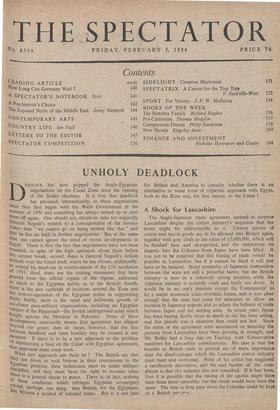UNHOLY DEADLOCK
EADLOCK has now gripped the Anglo-Egyptian negotiations on the Canal Zone since the opening of the Sudan elections. It is true that deadlock has persisted, intermittently, in these negotiations since they first began with the Wafd Government in the summer of 1950 and something has always turned up to start them off, again. One should not, therefore, take too tragically General Neguib's remark to a correspondent .of the Sunday Times that " we cannot go on being treated like this " and that he has no faith in further negotiations. But at the same .„time one cannot ignore the trend of recent developments in Egypt. There is first the fact that negotiations have not been resumed, in spite of the high optimism about them before the current break; second, there is General Neguib's defiant attitude over the Canal itself, where he has chosen, unilaterally, to extend his blockade in contravention of the UN resolution Of 1951; third, there are the rousing statements that have Poured from the official organs of the regime,' addressed as much to the Egyptian public as to the British; fourth, there is the new outbreak of incidents around the Zone and the non-co-operation of the Egyptian police in suppressing them; finally, there is the rapid rand deliberate growth of so,i-disant para-military organisations, including an Egyptian version of the Hagannah—the Jewish underground army which fought against the Mandate in Palestine. None of these evelopments necessarily means that agreement has slipped beyond our grasp; they do mean, however,. that the line between deadlock and open hostility• may be crossed at any moment. If there is to be a new approach to the problem of maintaining a base on the Canal with Egyptian agreement, that approach must come soon. .., What new approach can there be ? The British say that 1.,neY are down to rock bottom in their concessions to the .gYptian position; their technicians must be under military discipline, and they must have the right to re-enter when there ere is a general threat to peace. There is, in fact, nothing M these conditions which infringes Egyptian sovereignty except, perhaps, one thing : that Britain, for the Egyptians, "as become a symbol of colonial status. But is it not time


































 Previous page
Previous page